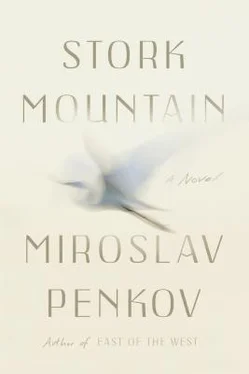Miroslav Penkov - Stork Mountain
Здесь есть возможность читать онлайн «Miroslav Penkov - Stork Mountain» весь текст электронной книги совершенно бесплатно (целиком полную версию без сокращений). В некоторых случаях можно слушать аудио, скачать через торрент в формате fb2 и присутствует краткое содержание. Год выпуска: 2016, Издательство: Farrar, Straus and Giroux, Жанр: Современная проза, на английском языке. Описание произведения, (предисловие) а так же отзывы посетителей доступны на портале библиотеки ЛибКат.
- Название:Stork Mountain
- Автор:
- Издательство:Farrar, Straus and Giroux
- Жанр:
- Год:2016
- ISBN:нет данных
- Рейтинг книги:4 / 5. Голосов: 1
-
Избранное:Добавить в избранное
- Отзывы:
-
Ваша оценка:
- 80
- 1
- 2
- 3
- 4
- 5
Stork Mountain: краткое содержание, описание и аннотация
Предлагаем к чтению аннотацию, описание, краткое содержание или предисловие (зависит от того, что написал сам автор книги «Stork Mountain»). Если вы не нашли необходимую информацию о книге — напишите в комментариях, мы постараемся отыскать её.
Stork Mountain — читать онлайн бесплатно полную книгу (весь текст) целиком
Ниже представлен текст книги, разбитый по страницам. Система сохранения места последней прочитанной страницы, позволяет с удобством читать онлайн бесплатно книгу «Stork Mountain», без необходимости каждый раз заново искать на чём Вы остановились. Поставьте закладку, и сможете в любой момент перейти на страницу, на которой закончили чтение.
Интервал:
Закладка:
Some time passed before she answered, so I wasn’t sure she’d heard me. Only Dyado Dacho grunted in his corner. But then the clicking of the needles slowed down a little and I could see that she struggled to loop the yarn a few times.
“My sweet boy, don’t ask me. My feet are colder than dead bones, but when I knit, I barely notice. Yes,” she mumbled under her nose, “I barely notice,” and wrapped herself more tightly in the blanket.
“Forty years ago,” I said, “you and Dyado Dacho, and most everyone else in the village, moved to the city to seek a better life. Tell me, Grandma, where did the nestinari settle when they left Klisura?”
“Forty years,” Baba Mina repeated, as if for the first time stopping to consider just how much water had passed since then. “Back when I was little my daddy had a hundred white sheep. And each night we girls sat by the fire and spun wool as white as God’s beard and Mama knit us booties and jackets and hats with tassels. But Daddy is gone now,” she said, and the faint smile that had blossomed on her lips withered, “and so are the white sheep. Now all we have are old sweaters and Dyado Dacho unravels them, so I can knit from their yarn new ones. That’s where the nestinari went, my boy — after the white sheep. One by one, like unraveled sweaters. Yes, yes,” she said, and began to knit faster, “one by one, like white sheep.”
“Grandma,” I said, and for a long time didn’t know how to continue. “It’s Saint Kosta’s day tomorrow.” And by the way she looked at me — so gently, so helplessly — I understood, for the first time, that what I was doing was terribly cruel.
“It might be, my boy. But who’s counting.”
Sweat rolled down my back and itched me, and my tongue had swollen up so that every word rolled off crippled and clumsy. Or maybe it was just the ringing in my ears, the blood rushing, that muddied up all sound around me.
“There is a sick girl across the river, Grandma, the imam’s daughter, and I’d like to help her. I’d like to take her to where the nestinari are dancing so they can cure her.”
“And how will you do that?” Dyado Dacho sneered suddenly in his corner. “The girl’s locked up and her father guards her.”
“Elif will help me.”
“And when she helps you, how will you get to where the nestinari are dancing?”
“In her father’s Lada. We’ll steal it.”
“Steal it?” He laughed and yanked on the yarn so hard almost a third of a sleeve unraveled. “He dismembered it, the crazy fool. The whole café went to see how he gutted it. Slashed the tires, cut the wires, threw out the battery in the garbage. He was that mad with fury.”
With each word I could feel my heart sinking, my plan unraveling like an old sweater. It was hopeless then and like Elif had told me — there was no way out of Klisura. The logs crackled in the fire, the needles were clicking, and I was ready to ask forgiveness and scurry back home to my grandfather, when Dyado Dacho stopped me.
“Every spring for many years I watch this poor woman get sick without a sickness,” he said, his voice barely louder than the rasp of sand grains against the window. “I’m tired of watching. I’ll tell you where the nestinari are dancing if you promise to take her.”
I hadn’t even noticed when he’d gotten up from his chair and come to ours, but Baba Mina held his hand now, against her cheek, then kissed it.
“And what if you tell me?” I said. “We have no car to get there.”
“Then leave the way you came here.”
I wasn’t sure if he meant this, or if he was trying to trick me.
“On the village bus? The driver will never take us.”
Then I could see his lips stretching and his dentures shining like they were made of the fire. “Why bother to ask him?”
EIGHT
IT SO HAPPENED, SIX CENTURIES AGO, that Murad the Godlike One — he who first called himself sultan, he who defeated a great many peoples, seized their land, and made from his Ottoman tribe a mighty empire — fell in love with a Bulgarian maiden and desired to wed her.
Murad’s armies had conquered Adrianople and turned it into their capital city. There in Adrianople, the Godlike One plotted his European expansion. The Byzantines were already paying him tribute, and their turn to meet him in battle would come soon, but it was other wars Murad needed to plot first — with Bulgarians, Serbians, Magyars. Not a fortnight before, he had sent his spies into the land of the Bulgars and now the spies were recounting — such and such strongholds, such and such armies. Only one of them was gloomy, and when the sultan addressed him, the man began weeping. “I weep for you, my lord,” he said, “because I love you. You may conquer the world one day, but what good is this if you never see them?” And the spy told him: where a mighty river flowed into the Black Sea, where the sands were the color of Makassar ebony, beautiful women danced barefoot in the fire and the fire did not burn them. “No, my lord, the flame makes them so pretty it is for them that I weep now. For I shall never again see them.”
For days all Murad saw were the bare feet of maidens dancing on live coals. The feet, white and puffy, raised sparks in his mind and like tired birds these sparks landed on his heart and burned it. Soon enough, the great sultan was standing aboard a fast boat, and three hundred other boats followed behind him. At the place where a mighty river flowed into the Black Sea there was a village and in no time its elders were bowing before the sultan. “I’ve come to see the women dancing,” he told them, “so start the fires!”
A thin crescent hung in the sky by the time the wood had turned to embers. And since Murad’s feet never touched land that the blood of his men had not made pure first, he waited in the boat, right by the black shore. No wind stirred the night and only the sea sighed deeply. Sorrow filled the sultan’s heart. He had accomplished so little and there was still so much more that needed doing. As it happened with each nightfall, his grandfathers rose within him, lustful for conquests, and began to pull him eagerly in a thousand directions. How tired he was. How weary. And if Allah had come to ask him what he wanted, in this very moment, he would have said, “A sigh of rest, Almighty, in a boat by a black shore, waiting for beautiful women.”
A drum began beating in the night; a bagpipe joined it. So deep had the sultan sunk in thought that he hadn’t noticed anyone coming. And so it seemed to him now that the flame took flesh — a girl in a white robe, with her hair so long it almost touched the embers and white like the bones of the world. Then the girl gave out a loud shriek, and when she threw back her head her hair really swept the embers; its ends crackled and the stench of battle filled the air.
This was an omen, Murad knew. But good or bad, he wasn’t certain. More girls rose from the fire and he watched them carry their infidel icons, jumping and thrashing, crying like flame birds from the Arabian Desert. Soon he didn’t see the others — only the girl with the white hair.
He could not wait for the dance to be over. He waved to his soldiers to stop the drum from beating, the bagpipe from shrieking, and he called the girl to come near. Yet the girl wouldn’t listen. She kept spinning and turning and so the sultan ordered his men to bring her over. Embers had stuck to her bare feet, to her long gown, and when she waded into the sea the water hissed and smoke rose in thick puffs.
What fool , she said angrily in his language, dares stop my drum from beating? What fool pulls my girl out of the fire?
For such words, many a head would have rolled already. But Murad only smiled softly. “Get in the boat,” he told her, “I’m taking you with me.” The girl’s hair floated around her, like a thing living, and for a moment the sultan watched it. A strange feeling bloomed in his heart — that he had met this girl before, that he had always known her. When next he looked up, more girls in white gowns had surrounded his boat like jellyfish flocking.
Читать дальшеИнтервал:
Закладка:
Похожие книги на «Stork Mountain»
Представляем Вашему вниманию похожие книги на «Stork Mountain» списком для выбора. Мы отобрали схожую по названию и смыслу литературу в надежде предоставить читателям больше вариантов отыскать новые, интересные, ещё непрочитанные произведения.
Обсуждение, отзывы о книге «Stork Mountain» и просто собственные мнения читателей. Оставьте ваши комментарии, напишите, что Вы думаете о произведении, его смысле или главных героях. Укажите что конкретно понравилось, а что нет, и почему Вы так считаете.











